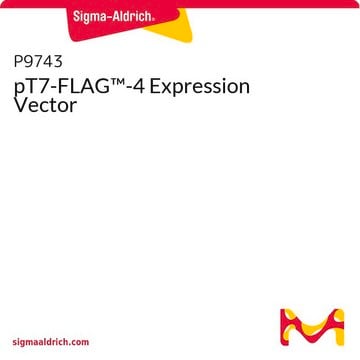71146
pETDuet-1 DNA - Novagen
pETDuet-1 is designed for the coexpression of two target genes. The vector encodes two multiple cloning sites, each of which is preceded by a T7 promoter, lac operator and ribosome binding sites.
Synonyme(s) :
Dual Expression Vector
Se connecterpour consulter vos tarifs contractuels et ceux de votre entreprise/organisme
About This Item
Code UNSPSC :
41106602
Nomenclature NACRES :
NA.51
Produits recommandés
Étiquette/Marqueur
His tagged
S-Tag tagged
Niveau de qualité
Forme
liquid
Fabricant/nom de marque
Novagen®
Conditions de stockage
OK to freeze
Promoteur
Promoter name: T7
selection
ampicillin
Conditions d'expédition
wet ice
Température de stockage
−70°C
Catégories apparentées
Description générale
Coexpression of multiple target genes in E. coli is advantageous for studying protein complexes. Coexpression often achieves optimal yield, solubility, and activity and may protect individual subunits from degradation. The Duet vectors are T7 promoter expression vectors, each designed to coexpress two target proteins in E. coli. The Duet vectorscarry compatible replicons and antibiotic resistance markers and may be used together in appropriate host strains to coexpress up to eight proteins. Certain combinations of Duet vectors and pET or pETcoco vectors are also compatible for coexpression. The capability of Duet vectors to be cotransformed, propagated, and induced for robust target proteincoexpression makes them ideal for the analysis of protein complexes. The Duet vectors are designed with compatible replicons and drug resistance genes for effective propagation and maintenance of four plasmids in a single cell.
pETDuet-1 is designed for the coexpression of two target genes. The vector encodes two multiple cloning sites (MCS), each of which is preceded by a T7 promoter, lac operator and ribosome binding site (rbs). The vector also carries the pBR322-derived ColE1 replicon, lacI gene and ampicillin resistance gene. This vector can be transformed into the same cell with pACYCDuet-1, pCDFDuet-1, and pRSFDuet-1 or pCOLADuet-1 in the appropriate host strain for the coexpression of up to eight target genes. Genes inserted into MCS-1 can be sequenced using the pETUpstream Primer and DuetDOWN1 Primer. Genes inserted into MCS-2 can be sequenced using the DuetUP2 Primer and T7 Terminator Primer.
Commercial use of this Product requires a commercial license from EMD Millipore Corporation. Commercial use shall include but not be limited to (1) use of the Product or its components in manufacturing; (2) use of the Product or its components to provide a service, information, or data to others in exchange for consideration; (3) use of the Product or its components (or any derivatives thereof) for therapeutic, diagnostic or prophylactic purposes (including as part of a device, chip, assay or other product); or (4) resale of the Product or its components, whether or not such Product or its components are resold for use in research. Nothing contained herein shall be deemed to represent or warrant that additional third party rights are not required for use of this Product.
pETDuet-1 is designed for the coexpression of two target genes. The vector encodes two multiple cloning sites (MCS), each of which is preceded by a T7 promoter, lac operator and ribosome binding site (rbs). The vector also carries the pBR322-derived ColE1 replicon, lacI gene and ampicillin resistance gene. This vector can be transformed into the same cell with pACYCDuet-1, pCDFDuet-1, and pRSFDuet-1 or pCOLADuet-1 in the appropriate host strain for the coexpression of up to eight target genes. Genes inserted into MCS-1 can be sequenced using the pETUpstream Primer and DuetDOWN1 Primer. Genes inserted into MCS-2 can be sequenced using the DuetUP2 Primer and T7 Terminator Primer.
Commercial use of this Product requires a commercial license from EMD Millipore Corporation. Commercial use shall include but not be limited to (1) use of the Product or its components in manufacturing; (2) use of the Product or its components to provide a service, information, or data to others in exchange for consideration; (3) use of the Product or its components (or any derivatives thereof) for therapeutic, diagnostic or prophylactic purposes (including as part of a device, chip, assay or other product); or (4) resale of the Product or its components, whether or not such Product or its components are resold for use in research. Nothing contained herein shall be deemed to represent or warrant that additional third party rights are not required for use of this Product.
Avertissement
Toxicity: Standard Handling (A)
Autres remarques
Vector Family: Duet pET bacterial prokaryotic
Informations légales
NOVAGEN is a registered trademark of Merck KGaA, Darmstadt, Germany
Code de la classe de stockage
10 - Combustible liquids
Classe de danger pour l'eau (WGK)
WGK 1
Point d'éclair (°F)
Not applicable
Point d'éclair (°C)
Not applicable
Certificats d'analyse (COA)
Recherchez un Certificats d'analyse (COA) en saisissant le numéro de lot du produit. Les numéros de lot figurent sur l'étiquette du produit après les mots "Lot" ou "Batch".
Déjà en possession de ce produit ?
Retrouvez la documentation relative aux produits que vous avez récemment achetés dans la Bibliothèque de documents.
Yang Zhang et al.
Journal of molecular biology, 431(24), 4882-4896 (2019-11-05)
Multidrug-resistant gram-negative bacteria infection is particularly severe within the designated ESKAPE pathogens (Enterococcus faecium, Staphylococcus aureus, Klebsiella pneumoniae, Acinetobacter baumannii, Pseudomonas aeruginosa, and Enterobacter species), which underscores the urgent need to explore alternative therapeutic strategies. The type III secretion system
Notre équipe de scientifiques dispose d'une expérience dans tous les secteurs de la recherche, notamment en sciences de la vie, science des matériaux, synthèse chimique, chromatographie, analyse et dans de nombreux autres domaines..
Contacter notre Service technique





